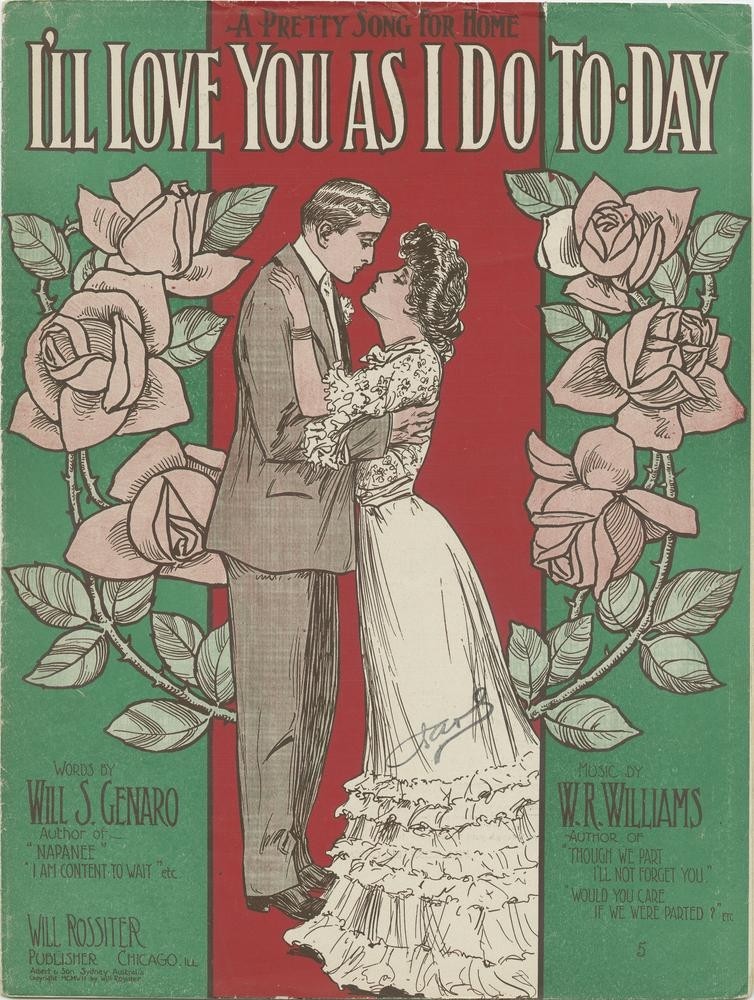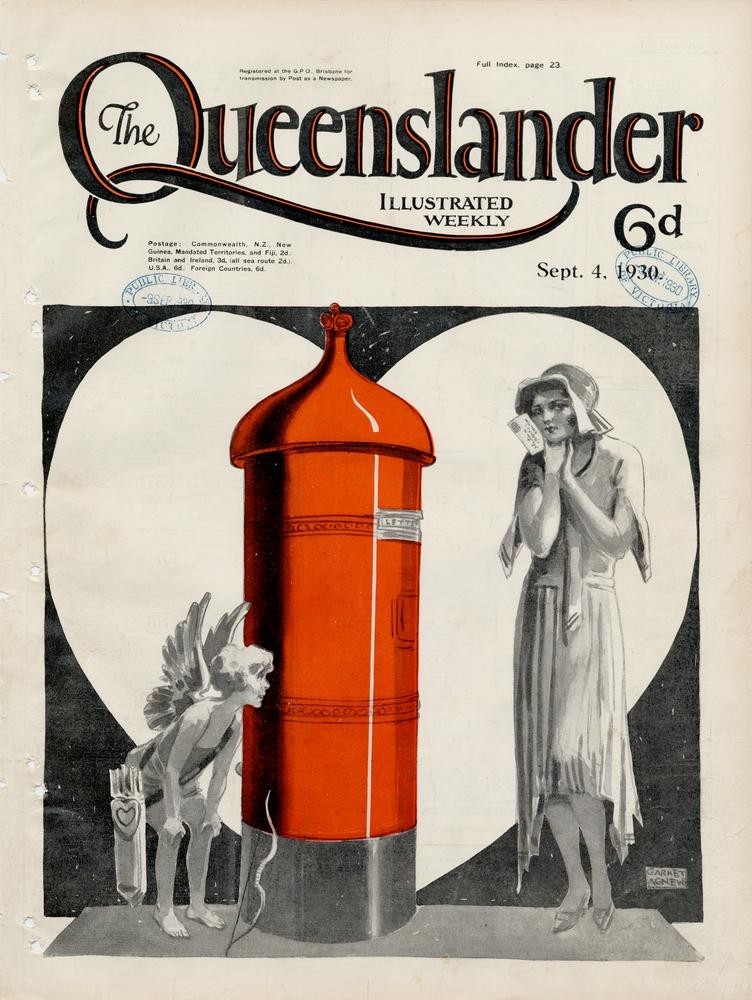Lessons in "old school" love - Part 1
By Myles Sinnamon, Project Coordinator, State Library of Queensland | 14 February 2013

I'll love you as I do today (1906). Sheet music from the collection of the State Library of Queensland. Image no 78681
Finding the perfect partner or soul mate can be a daunting prospect. Sometimes in desperation we turn to the media (books, newspapers, magazines, television) for advice on how to find love. What resources did previous generations of Australians turn to?
Art of conversation
When boy first meets girl conversation between the two can be an awkward process. Victorian journalist Theodosia Ada Wallace provides advice on these types of dilemmas in her 1909 book, The etiquette of Australia : a handy book of the common usages of everyday life and society.
Theodosia is scathing of men who don't talk. "A girl afflicted with a “silent partner” is much to be pitied. Such a man is selfishly refraining from using his brain.” She advises men to just talk - about anything! “Most people say they don’t know what to talk about. Talk about your hobby. It may not bore the girl; even if it does, she would be more bored by silence”
But all is not lost, women can prompt their male companion into conservation with leading questions – such as “Do you play football?” and “Have you a garden?”. She also identifies the theatre as the ultimate icebreaker, as this is “always a pleasant and interesting topic for strangers to discuss, much preferable to the weather”.
Visiting
"A man never calls upon a lady, until he has been asked to do so. But of course a lady, especially if she is unmarried, would not ask a man to call unless she thought he was sure to avail himself of the permission""In Australia" "girls sometimes ask men to their mothers' houses, but should not do so in their first season"
With a gentleman caller, you should always greet and take leave of him in the drawing room. It is not "good form" for a lady to greet a man in the hallway. She strongly emphasises that, not under any circumstances, should a lady "help a man on with his overcoat, struggle as he may".
Seeking a first date
An interesting article on the topic of courtship was published in the Blackall newspaper, The Western Champion, in 1887. The article had quite an extensive range of advice. This includes paving the way with a prospective lover by writing them a note requesting an interview. The article also provides suggested wording for this letter....
"Dear Miss ___, I write for the purpose of requesting that you will favour me with an appointment for an interview, at which I very earnestly desire to secure your approval of what I desire to communicate. I await your reply with feelings of anxiety, which I trust you will mitigate by avoiding delay.-Yours most faithfully, ___.
This approach could be risky as you may receive the following negative response from the young lady:
"Sir,-Your letter is so surprising and unexpected, that I must decline without further consideration the interview you request, as I cannot imagine any subject which would render such a meeting between us desirable.-Yours truly, ___"
Or if you're lucky:
"Dear Mr. ,-In reply to your letter, I write to inform you that I shall be at home to-morrow from __ to __, or shall walk in the park from __to__ to-morrow evening.-Yours truly, ____"

Illustrated front cover from The Queenslander September 4 1930. State Library of Queensland. Image no. 702692-19300904-s001b
Chaperons
Australian etiquette – rules of good society (1938) by Lillian M. Pyke, considers chaperons essential when attending a ball. She advises that a girl should return to her chaperon after every dance. If you can’t find your chaperon, then you need to “claim chaperonage” from any older lady present, whether she knows you or not.
For an alternative perspective on the chaperon we can turn to Theodosia again, who also believed in the institution of the chaperon, though with a bit of a twist. "In Australia, where a woman is never too old to enjoy herself, she catches at any excuse that will take her into the world of pleasure. Some of us have an idea that chaperonage was invented by some lady or ladies who were tired of being on the shelf. ... It is better to play second fiddle than to take no part in the orchestra."
Theodosia in her book from 1909 suggests that chaperonage may be taken too far, and in some case may be safely dispensed with. "In cases where the man is an intimate friend of the family and can be trusted to look after the girl properly, mothers may safely stretch a point and allow their daughters to go unchaperoned. No supper afterwards is a rule that must be obeyed."
Love letters
An article from The Queensland Figaro published in 1924 discusses the art of writing love letters. Their advice hasn’t really dated at all in the intervening years.
"I love you" - that is what the ideal love letter ought to say. There are lots of different ways of saying that one simple thing. But if a love letter doesn't say it in one way or another-well, it simply isn't a love letter at all. It may be a charming essay. It may be a scintillating collection of epigrams. It may be a model of graceful compliments and pretty nothings. But it isn't a love letter."
Myles Sinnamon - Project Coordinator, State Library of Queensland
Comments
Your email address will not be published.
We welcome relevant, respectful comments.